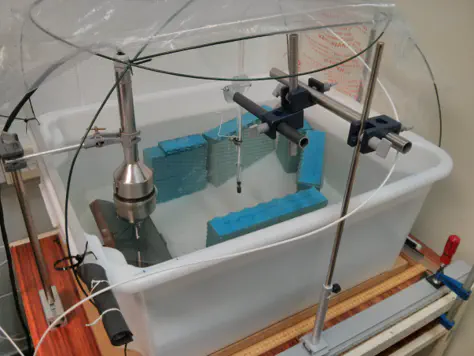Characterization of hydroacoustic materials
Mathematical modelling and numerical characterization of the frequency response of a complex polymer (AptFlex SF5048)
 Polymer materials submerged in a water tank
Polymer materials submerged in a water tankThe material characterization is not an easy task for engineering materials such as polymers (see figure on top) or composite materials. In some cases a suitable choice of the viscoelastic model is fundamental: the more appropriate the model is, the more accurate its mechanical response will be in comparison with the experimental data. Well-known viscoelastic material models such as Maxwell, Zener, and Kelvin-Voigt models, or the more recent fractional derivative viscoelasticity models are common choices for modeling linear wave propagation in viscoelastic materials. Usually, to estimate the unknown parameters, the constitutive laws are first fixed, and then the available experimental data are fitted with the response of the mathematical model.
 Figure 1: Experimental hydroacoustic setting to measure the mechanical properties of a layer of viscoelastic material.
Figure 1: Experimental hydroacoustic setting to measure the mechanical properties of a layer of viscoelastic material.
However, in this project, a data-driven approach is considered. This methodology avoids the need of choosing a constitutive law for fitting. Instead of this, the fitting problem consists of minimizing the distance between a set of experimental data and the computed values. Therefore, the choice of the viscoelastic model is based only on the experimental ultrasound measurements, and not on imposing any functional dependence of the parameters in terms of frequency. In this project (see Chapter 3 in [1]), a viscoelastic material has been characterized by using a data-driven approach instead of a classical parametric model. This material is part of a coupled problem formed by the material surrounded by water (see Figure 1).
References
[1] Laura del Río MartínNumerical characterization of complex materials and vibro-acoustic systems
Phd thesis in mathematical modelling and numerical simulation in engineering and applied science,Universidade da Coruña, 2020. Advisor: A. Prieto.